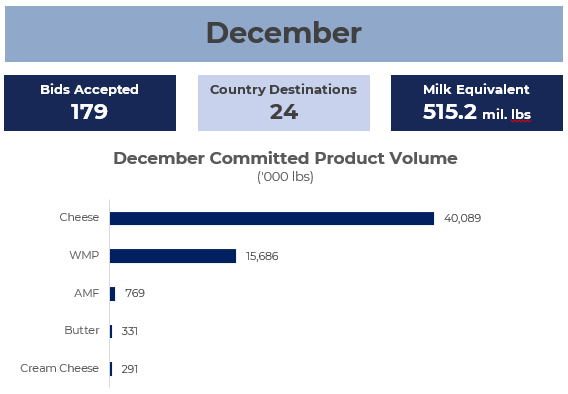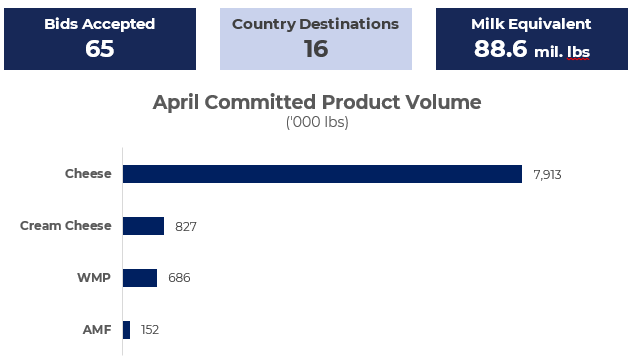The task force of farmers and cooperative leaders evaluating Cooperatives Working Together’s future on June 24 approved a series of improvements for the self-help program when it is renewed after 2024.
Following an extensive review of CWT’s current operations and an evaluation of the potential value of an expanded export assistance program, the task force endorsed several detailed proposals developed and refined by three working groups of cooperative staff experts in the areas of Product Mix; Bid Process Adjustments; and Market Development.
The task force’s decision will now be reviewed July 9 by the NMPF Executive Committee, and later by the full NMPF Board of Directors. The recommendations would then become part of the next CWT program cycle that begins Jan. 1.
The working group recommendations include updates to or added resources within the following program areas:
- All cheese varieties will be eligible for CWT’s price gap support
- CWT will create targeted pilot programs to address tariff coverage for value-added skim milk powder sales to Southeast Asia, and a target market premium for cheese sales to Central America & the Caribbean
- CWT will offer fat-equivalent support for the following products: ESL/aseptic fluid milk; evaporated/condensed milk; and ice cream
- CWT will increase its operating program bid flexibility to extend eligible delivery periods to 12 months, and remove volume limits on a trial basis
- CWT staff will provide increased insight on bid acceptance parameters, sharing a brief summary with weekly offers explaining shifts in support levels; and
- CWT will create an advisory group to provide strategic direction and market development support, with a Phase I emphasis on pre-competitive support that provides opportunities for all cooperatives to participate.
The task force met earlier at NMPF’s June Board meeting to receive a preview of working group activity and to review a recent assessment of CWT’s impact on milk prices.
During its meeting, the Board of Directors approved five objectives to pursue as part of the renewal effort for the CWT program after 2024. They include:
- CWT should seek to achieve the highest participation of cooperatives in the export assistance program
- The contribution made to CWT should be at a level that maximizes the benefit back to dairy producer milk prices, not to exceed 4 cents per cwt.
- CWT’s export assistance program should promote consistent supplies of U.S. dairy products into foreign markets. Assistance offered should create competitively landed values for U.S. dairy products that will impact milk prices paid to U.S. dairy producers
- CWT should enhance program operations (e.g., processes and program reviews) including establishment of an operating committee to help direct those functions; and
- CWT should explore market development opportunities within its overall program budget structure.
June CWT-Assisted Export Sales Top 5.4 Million Pounds
CWT member cooperatives secured 56 contracts in June, adding 5.4 million pounds of product to CWT-assisted sales in 2024, an amount equal to 47.8 million pounds of milk on a milkfat basis. These products will go to customers in Asia, Central America, the Caribbean, Middle East-North Africa, Oceania and South America and will be shipped from June through December 2024.
Exporting dairy products is critical to the viability of dairy farmers and their cooperatives across the country. Whether or not a cooperative is actively engaged in exporting cheese, butter, anhydrous milkfat, cream cheese, or whole milk powder, moving products into world markets is essential. CWT provides a means to move domestic dairy products to overseas markets by helping to overcome U.S. dairy’s trade disadvantages.
The amounts of dairy products and related milk volumes reflect current contracts for delivery, not completed export volumes. CWT will pay export assistance to the bidders only when export and delivery of the product is verified by the submission of the required documentation.







